New York Times, New York, New York, Monday, July 10, 1972 - Page 19
Fischer's Favorite Chair Flown To Reykjavik for Chess Contest
Reykjavik, Iceland, July 9 (UPI)—Bobby Fischer's favorite chair arrived by air freight from New York today to help assure his comfort in his match against Boris Spassky for the world chess championship.
★ Fred Cramer, a vice president of the U.S. Chess Federation acting as Fischer's spokesman, said he was certain the first of the 24 scheduled games will be played Tuesday “unless Spassky is still ill.”
The fact that the official match arbiter, West German Grandmaster Lothar Schmid, has returned to his home in Bamberg and will not be back in Reykjavik until Thursday “will not stop the game,” Cramer said.
Schmid flew home Saturday after his son had been injured in a traffic accident. Schmid's deputy, Gudmunder Arnlaugsson of Iceland, will take charge of the first game in the $250,000 match for the world title.
The players must still give their official approval of the playing conditions, but Spassky said yesterday before going salmon fishing that he would not argue about the conditions or the selection of a board and a chess set.
“I will leave that to Fischer. It makes no difference to me,” the 35-year-old Soviet star said.
Fischer, who has been in the hall where the match is to be played, complained about a number of things, including the chairs, the light and the board.
Since he could find no chair to fit him—the 29-year-old challenger is much taller than Spassky—Fischer decided to have his own favorite chair shipped from New York. It arrived aboard an Icelandic Airlines jetliner.
The match was postponed once last week as Fischer held out for more money—the purse is now $250,000—and twice more when the Russians demanded that Fischer be penalized for the delay. They finally settled for a written apology from Fischer to Spassky.
The Daily Chronicle De Kalb, Illinois Monday, July 10, 1972 - Page 3
Fischer's Chess Chair Arrives
Reykjavik, Iceland (UPI) — The Boris Spassky-Bobby Fischer world chess match can begin—Fischer's favorite chair has arrived.
★ American chess challenger Bobby Fischer slipped into the Reykjavik Sports Arena before dawn today for a minute inspection of the facilities provided for the start of tomorrow's championship match with world titleholder Boris Spassky.
Chess sources said Fischer left a list of complaints about the lighting, the table and other facilities. They said all the complaints could be straightened out before Tuesday's game.
★ Fischer's second, the Rev. William Lombardy, said later the 20-year-old challenger was ready to play. “I don't know if he is thinking of chess but he is ready.” Lombardy said.
“Fischer does not like the lighting, the board and the pieces, the location of the TV cameras and some other minor details. These things are troublesome but not critical. The organizers are already doing something about it,” said Fred Cramer, vice president of the U.S. Chess Federation.
Cramer said Fischer spent 80 minutes going through the set.
Earlier, Fischer had his favorite chair, a black leather and metal swivel model, flown in from New York.
Spassky's Russian advisers arrived shortly after the much talked about chair and studied it suspiciously. Then they left without comment.
Now the Icelandic organizers face a new problem: Where to find a similar chair in Iceland? “It would look better if both Spassky and Fischer had the same chairs,” said Gudmundur Thorarinsson, president of the Icelandic Chess Federation.
Fischer took one look at the dozen different chairs the Icelanders had assembled from Reykjavik's furniture stores the other day, sat down in some of them and then gave his verdict: “Fly in my own chair.”
Spassky, the 35-year-old world champion, did not seem to worry much about details of the $250,000 match.
Before leaving for a salmon fishing tour of northern Iceland the defending champion said, “I am not going to argue about chairs, chess boards and sets. I will leave that to Bobby. It makes no difference to me.”
After lengthy and dramatic preludes, both Fischer and Spassky appeared ready to start the first of their 24 games Tuesday.
★ But the players still have to inspect and approve the facilities in the hall, where the organizers expect 3,000 fans paying $5 each to be on hand.
“Bobby is relaxed and ready. We will play Tuesday unless Spassky is ill,” said Fred Cramer, vice president of the U.S. Chess Federation.
★ Gudmundur Arnlaugsson, deputy referee of the match, spent all day yesterday polishing off the fine details. He tested several chess boards and finally settled for one made in Iceland specially for the match. It has been put together from Icelandic stones.
★ Arnlaugsson, who had to take over when chief referee Lothar Schmid of Germany flew home Saturday, also has a choice of five or six different chess sets of various sizes.
Schmid said he would return Thursday after visiting his son, who was injured in a traffic accident.
The San Francisco Examiner San Francisco, California Monday, July 10, 1972 - Page 20
Will Chess Become Great Spectator Sport? by Joel Tiumak
Chess has all the ingredients of a great spectator sport — for the edification of sceptics who view tomorrow's television re-creation of the Fischer-Spassky world chess championship without much fervor.
True, there are some drawbacks — but if you're objective, you cannot fail to see that chess is on its way competing with football, baseball, basketball and tennis as one of America's top sports attractions.
Like football and baseball, chess is readily accessible to sport fans — except chess is cheaper, even free.
Just go to the Golden Gate Park recreation tables at Stanyan and Page Streets and you'll see chess matches free of charge — minor league, of course, but some of the players are so fascinating to watch.
Or go to the Mechanics' Institute at 57 Post St., where San Francisco's chess center is located on the Fourth Floor. Here, too, the matches are free. But this is the big league — and the atmosphere is quite different from the Golden Gate Park scene.
“Banging the chess or checker pieces or making any unnecessary noise when resetting them will not be tolerated” says one of the rules posted on the wall of the institute's Chess and Checker Room.
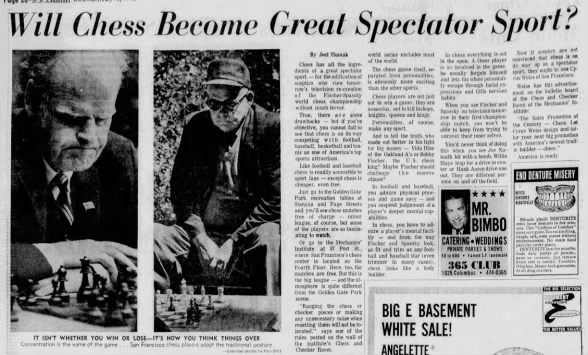
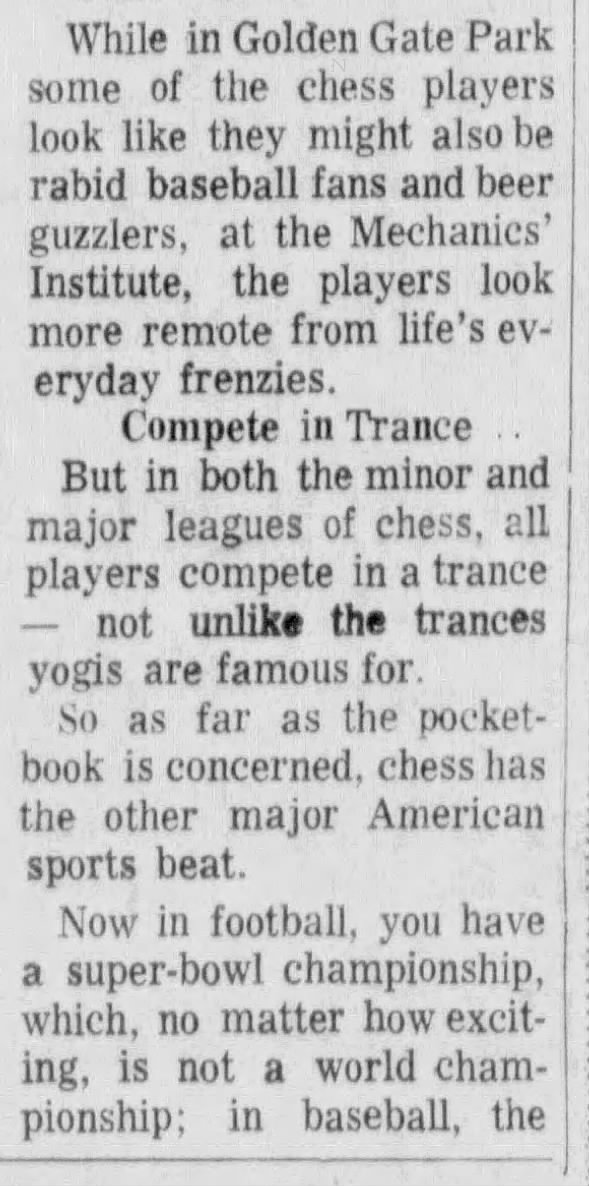 Will Chess Become Great Spectator Sport? 10 Jul 1972, Mon The San Francisco Examiner (San Francisco, California) Newspapers.com
Will Chess Become Great Spectator Sport? 10 Jul 1972, Mon The San Francisco Examiner (San Francisco, California) Newspapers.com
While in Golden Gate Park some of the chess players look like they might also be rabid baseball fans and beer guzzlers, at the Mechanics' Institute, the players look more remote from life's everyday's frenzies.
Compete in Trance
But in both the minor and major leagues of chess, all players compete in a trance — not unlike the trances yogis are famous for.
So as far as the pocket-book is concerned, chess has the other major American sports beat.
Now in football, you have a super-bowl championship, which, no matter how exciting, is not a world championship; in baseball, the world series excludes most of the world.
The chess game itself, separated from personalities, is obviously more exciting than the other sports.
Chess players are not just out to win a game; they are assassins, out to kill bishops, knights, queens and kings.
Personalities, of course, make any sport.
And to tell the truth, who made out better in his fight for big money — Vida Blue of the Oakland A's or Bobby Fischer, the U.S. chess king? Maybe Fischer should challenge the reserve clause?
In football and baseball, you admire physical prowess and game savvy — and you suspend judgment of a player's deeper mental capabilities.
In chess, you have to admire a player's mental facility — and from the way Fischer and Spassky look, as fit and trim as any football and baseball star (even trimmer in many cases), chess looks like a body builder.
In chess everything is out in the open. A chess player is so involved in the game, he usually forgets himself and lets his whole personality escape through facial expressions and little nervous habits.
When you see Fischer and Spassky on television tomorrow in their first championship match, you won't be able to keep from trying to unravel their inner selves.
You'd never think of doing this when you see Joe Namath hit with a bomb, Willie Mays leap for a drive in center or Hank Aaron drive one out. They are different persons on and off the field.
Now if sceptics are not convinced that chess is on its way up as a spectator sport, they ought to see Cyrus Weiss of San Francisco.
Weiss has this advertisement on the bulletin board of the Chess and Checker Room of the Mechanics' Institute:
“The Sales Promotion of the Century — Chess. Let Cyrus Weiss design and tailor your next big promotion with America's newest traffic builder — chess.”
America is ready.
The Herald Statesman Yonkers, New York Monday, July 10, 1972 - Page 30
Fischer: A Muhammad Ali of Chess, But With Less Talk by Kathie Beals
When Bobby Fischer, challenger of world champion Boris Spassky, played against members of the Westchester Shore Chess Club last January, new memberships increased five-fold and many of the recruits were teen-agers. Now the club numbers more than 100 as against 30 a year ago. Nationally, chess club memberships have jumped from 30,000 to 60,000.
The former child prodigy of chess — he was U.S. champion at 14 — reminds some fans of a prize fighter.
“HE'S THE MOHAMMAD ALI of chess,” said Nick Percival of Chappaqua as he took time out from a game at the Mamaroneck Free Library where the Westchester Shore Chess Club meets Wednesday nights and Saturday mornings.
“Fischer doesn't talk that much. He's more like Marciano, I'd say, a real slugger,” was club secretary Joseph Dayton's comment.
“His sportsmanship is atrocious ([and that's not accounting for the atrocious behavior from the Soviet side either! on and off the chess board]) but chess is a game in which emotions play a very important part. It's demanding both emotionally and psychologically,” said Michael Bermant who was annotating his game against Percival for future analysis.
ALTERNATELY DEPLORING
Fischer's delaying tactics prior to the championship series in Iceland which starts Tuesday and attributing them to “our money-oriented culture,” ([oh there's much more, fails emphasizing Belgrade/Reykjavik organizers refused communication with Fischer pre-match. Or tell of Belgrade's illegal 35K USD guarantee the USCF refused to shell up, Australia's 225K bid USSR snubbed via pressure on FIDE to renege or, USSR picking Anti-American, racist, Iceland who forbid blacks on Iceland's soil, achieving media censorship, or, plot to disqualify Fischer and replace with USSR's Petrosian. So much still remains untold here!]) chess fans here united in their support for the only full-time pro in the game.
“Fischer has changed the power structure in chess,” said Percival. “Three years ago the winner of the world championship got $1,800. Now he gets five-eighths of $250,000.”
If Fischer were a chess piece, which one would he be?
“THE QUEEN, of course, because he's all over the place,” said Dayton.
Paul Spindel of Scarsdale, who will meet Ken Frieden in the Class A local championship, says he plans to follow the international championship series, which will be played at the rate of three games a week, on television and in the newspapers.
“I'll follow the games and then I'll replay them, from the annotation,” he said. “Some of Fischer's games are really works of art—he's a very creative person.”
THE 24-GAME SERIES will be won by the first man to get 12½ points. Scoring is based on one point for a win and ½ point for a draw.
“Playing at the rate of three games a week — Tuesdays, Thursdays and Sundays — this could go on until snow flies,” said Dayton.
Although Fischer is said to be the only player making a living entirely through his chess games, stakes of up to $1,000 are common in chess tournaments, says Dayton.
“IT'S LIKE HORSE racing,” he explains. “The purse comes from the entrance fees. A lot of people make a supplementary income from chess and this is true of the Russians also.
“In the USSR, small children learn to play chess and if they show talent, they are subsidized by the state. Spassky, for example, is, I believe, an accountant, but he has all sorts of fringe benefits that let him live way beyond his salary.
“In the United States, some of the better players are subsidized by wealthy chess enthusiasts. I'm pretty sure that Fischer, when he was starting out, got the backing of one of the members of our own club.”
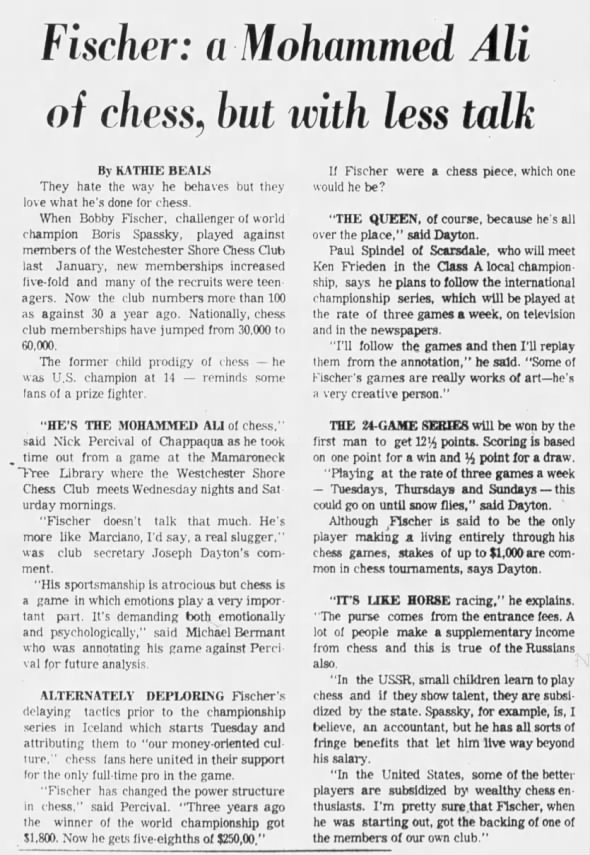 Fischer: A Muhammad Ali of Chess, But With Less Talk 10 Jul 1972, Mon The Herald Statesman (Yonkers, New York) Newspapers.com
Fischer: A Muhammad Ali of Chess, But With Less Talk 10 Jul 1972, Mon The Herald Statesman (Yonkers, New York) Newspapers.com
Dayton Daily News Dayton, Ohio Monday, July 10, 1972 - Page 43
Spassky Tried Money Gambit
Question: I know that Bobby Fischer, the chess great, can be pretty difficult about money, but what about the Russian Boris Spassky? Does he play for the glory of Russia?—D.G., Painesville, Ohio.
Answer: Spassky is just as prickly as Fischer about money. The 35-year-old Soviet player just caused a huge scandal by splitting with his long-time coach, claiming creative and business differences. The rumor in chess circles is that Spassky thought that as the world champion he ought to be getting more money than Fischer. Right now the Russian earns about $350 a month from his job as a chess coach at a Moscow club plus about $1,800 yearly for tournaments abroad. The official viewpoint is of course that the honor of being world champion ought to be enough and Spassky shouldn't be so crass.
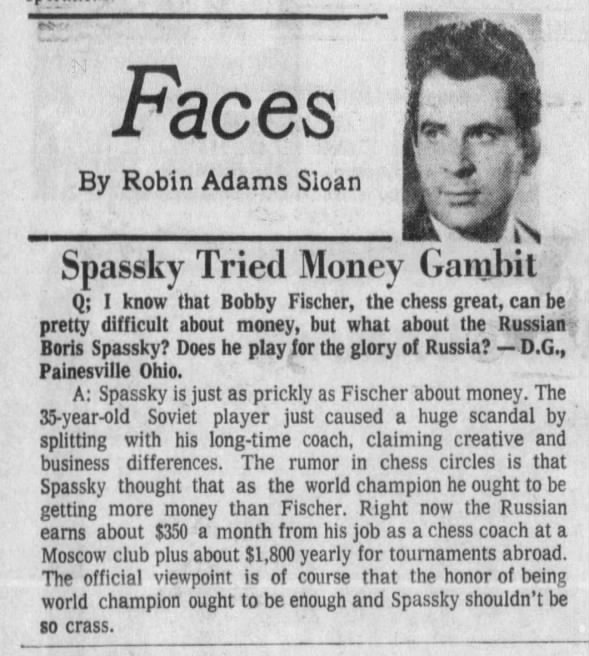 Spassky Tried Money Gambit 10 Jul 1972, Mon Dayton Daily News (Dayton, Ohio) Newspapers.com
Spassky Tried Money Gambit 10 Jul 1972, Mon Dayton Daily News (Dayton, Ohio) Newspapers.com
Courier-Post Camden, New Jersey Monday, July 10, 1972 - Page 1
U.S. Chess Master To Analyze Match by Dr. Leroy Dubeck, President, U.S. Chess Federation
THE CHESS MATCH between grandmasters Robert Fischer of the United States and Boris Spassky of the Soviet Union will commence in Reykjavik, Iceland, either tomorrow or Thursday.
Commentators have referred to this as the match of the century. This is the first time that the Soviets have been challenge by the United States for the world chess championship since they won the title immediately after World War II. All world championship matches since then have been between two Russian Grandmasters.
The prestige of the Soviet Chess Federation, with its three or four million members, is at stake. The Soviets have claimed that their chess superiority is an indication of their general cultural superiority over other countries ([do I smell Fascism?]) These past boasts will return to haunt them if Fischer becomes world chess champion.
In the United States, chess is only recently beginning to receive the attention in the mass media which is quite common in the Soviet Union and in other European countries. The United States Chess Federation, which is the official U.S. representative to the World Chess Federation, has about 30,000 members and subscribers.
Games are played on Tuesday, Thursday and Sunday of each week. Each player has 2½ hours in which to make his 40 moves. Games that are not finished within the five hour playing period are continued on the following day.
Each player may postpone up to three games because of illness. The first player to achieve a score of 12½ points is declared the winner of the match. Each win counts for one point, a draw for half a point, and a loss is scored as a zero. If the match lasts 24 games without either player scoring 12½ Spassky retains the World Championship. In short Spassky needs to score 12 points to win, while Fischer must score 12½ points out of the 24 games maximum.
The road to this historic match has been a rocky one indeed. Extended negotiations were held between the Icelandic organizers, and representatives of Fischer, Spassky, and the World Chess Federation. For a while, it appeared as though Fischer would not play, allegedly because of dissatisfaction with financial arrangements.
The two contestants were originally scheduled to divide $125,000, in prize money, with ⅝ going to the winner, When a wealthy British banker donated another $130,000 to the prize fund, Fischer flew to Iceland and is now, hopefully, ready to play chess. Then Spassky and the Soviet Chess Federation refused to play and demanded an apology from Fischer for his earlier actions which involved a two-day delay in the start of the match. This has led to a further day of at least a week and possibly nine days in the start of play.
Fischer and Spassky played five games with each other in the past. Spassky has won three of these games and two have ended in draws. However, Fischer is now playing better than in his previous encounters with Spassky and is generally favored to win the match.
Anyone wanting a free chess kit from the United States Chess Federation should write to me, care of this newspaper.
I plan to write a number of articles on the progress of this memorable match. I have met both Fischer and Spassky on a number of occasions in my capacity as president of the United States Chess Federation. Both are strong competitors and great players.
Chess is far more of an all consuming activity for Fischer than for Spassky. For example, Spassky has been giving regular news conferences, signing autographs, etc. and in general mixing with the chess public in Iceland. Fischer on the contrary has remained in relative seclusion since his arrival. ([An “Anti-American” underbelly is well documented since 1951. Reports in newspaper cite a 10% Soviet population in Iceland spreading Anti-American propaganda. Icelandic government had secret agreement with U.S. Government forbidding blacks to serve at Keflavik NATO base. Fischer's mentor/guest Archie Waters reports being the ONLY black man at or anywhere near the Sports Arena during the match! Anti-Americanism is “why” the Soviet Union/Russian Empire chose the racist haven for the match, hoping to demoralize Bobby Fischer and zap his will]) More on the similarities and differences on these two in later installments.
EDITOR'S NOTE: Dr. Leroy Dubeck, of 932 Edgemoor Rd., Kingston Estates, Cherry Hill, is president of the United States Chess Federation, representing more than 30,000 members.
In addition, he is rated a chess master of the United States, currently ranked 36th, and is vice president of the New Jersey State Chess Federation.
A native of Maplewood, N.J., Dr. Dubeck is single, an associate professor of physics at Temple University and plays chess at the Moorestown Chess Club, in addition to competing in national and international tournaments.
He knows personally Bobby Fischer, challenger of the United States and the world champion Boris Spassky of the Soviet Union. Dr. Dubeck will provide an exclusive analysis of the games played between Fischer and Spassky for Courier-Post readers.
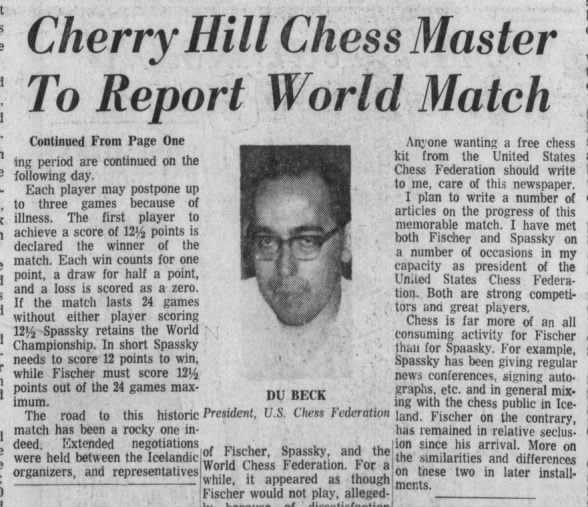
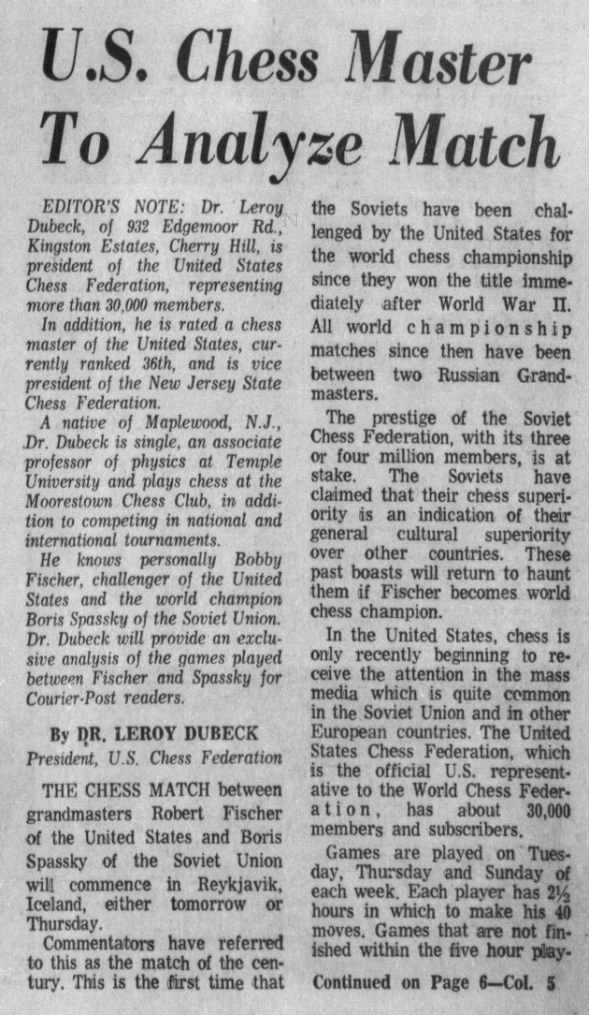
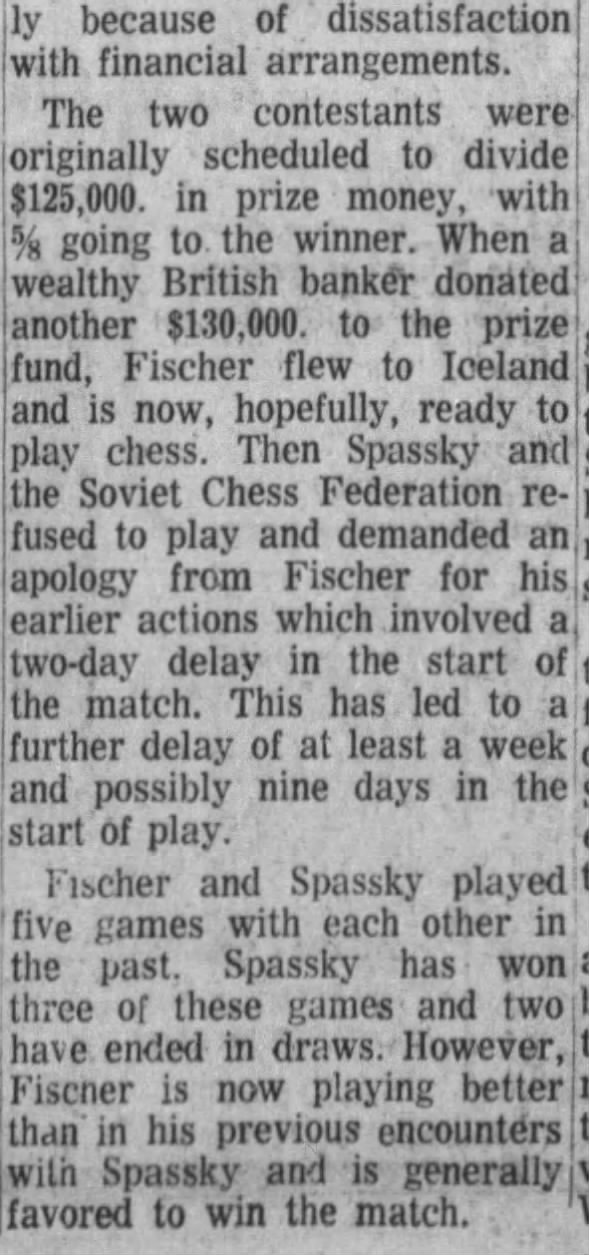 U.S. Chess Master To Analyze Match 10 Jul 1972, Mon Courier-Post (Camden, New Jersey) Newspapers.com
U.S. Chess Master To Analyze Match 10 Jul 1972, Mon Courier-Post (Camden, New Jersey) Newspapers.com
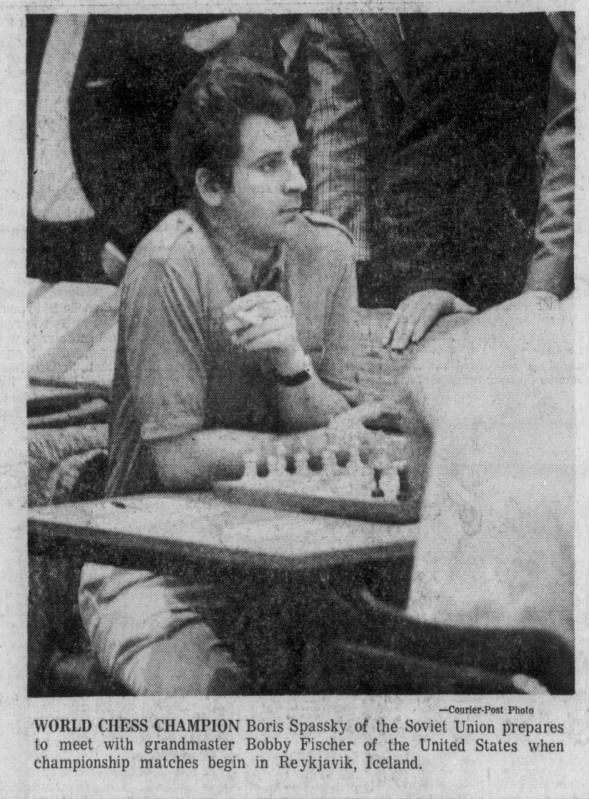
Council Grove Republican Council Grove, Kansas Monday, July 10, 1972 - Page 1
Can't Agree On Chess Board
(AP) With the Bobby Fischer-Boris Spassky chess match due to get underway belatedly Tuesday, workmen are rushing to finish the board on which they'll play.
Sigurdur Helgason, a stone mason in Reykjavik, Iceland, did not leave the job until the last minute. But the first board he made was considered too shiny and the second too light. The third was rejected by both the U.S. and Soviet grand masters as having squares that were too big.
Now, Helgason and his crew are making another board of marble and slate, and hope everyone will be happy.
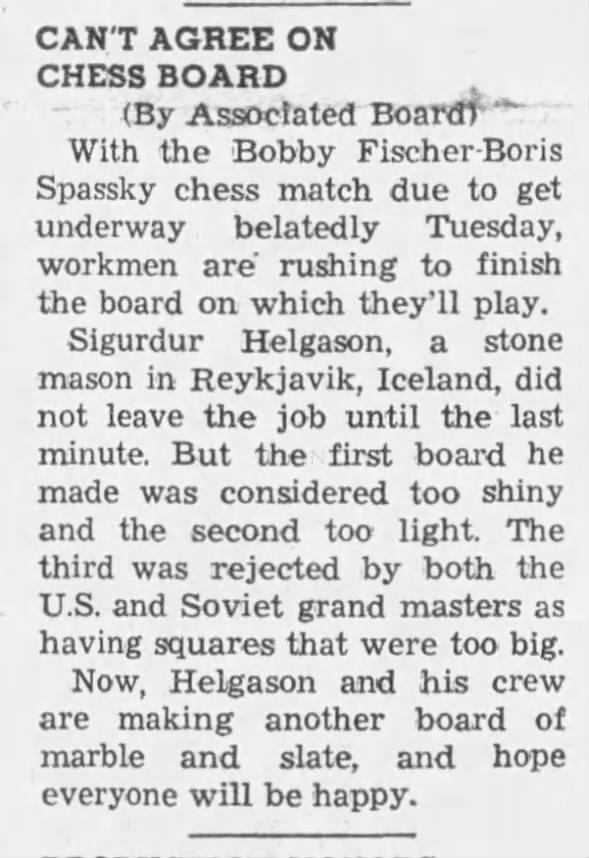 Can't Agree On Chess Board 10 Jul 1972, Mon Council Grove Republican (Council Grove, Kansas) Newspapers.com
Can't Agree On Chess Board 10 Jul 1972, Mon Council Grove Republican (Council Grove, Kansas) Newspapers.com
El Paso Herald-Post El Paso, Texas Monday, July 10, 1972 - Page 2
Fischer 'Unhappy' With Conditions
Chess Match Set for Tomorrow
Reykjavik, Iceland (UPI) — Challenger Bobby Fischer expressed dissatisfaction today with some of the arrangements in the hall where his world championship chess match with Boris Spassky of the Soviet Union is scheduled to begin tomorrow.
“Fischer does not like the lighting, the board and the pieces, the location of the television cameras and some other minor details,” said Fred Cramer, vice president of the U.S. Chess Federation.
Cramer said the “minor details” included the thickness of the window drapes used in the hall. Fischer prefers heavier drapes, he said.
“THESE THINGS are troublesome but not critical,” Cramer said. “The organizers are already doing something about it.”
Fischer, 29, of Brooklyn, N.Y. slipped unnoticed into the 3,000-seat hall early today and spent 80 minutes inspecting details arranged for the match that is scheduled to go as many as 24 games. There is a purse of $250,000 in addition to the world chess championship at stake.
Cramer said Fischer was “go, go, go” for the first game, scheduled to begin at 5 p.m. (1 p.m. EST) tomorrow.
HIS EVALUATION of the American was seconded by a Catholic priest and chess grand master who serves as Fischer's second.
“I don't know if he is thinking of chess, but he is ready,” said the Rev. William Lombardy.
While Fischer sought changes in the arrangements, Spassky said he was going to relax and not argue.
“I will leave that to Bobby. It makes no difference to me.” Spassky said.
Cramer, himself a retired lighting engineer, said he was not sure what Fischer objected to concerning the lighting.
FROM AN engineering point of view it's perfect and very flexible. But if you have to sit for five hours staring at a chess board you might have other ideas,” Cramer said.
The chess board, made of green and white Icelandic stones, has been an issue from the start. The organizers treated it with acid to take the glare off it.
Fischer is not satisfied with the board, however, and he also feels the chess pieces are too small in relation, Cramer said.
The Deputy arbiter for the match, Gudmundur Arnlaugsson, has a number of different boards and sets to choose from when match time comes.
FISCHER also felt the two TV camera covering the board could be distracting, although they are hidden in built-in “boxes” and placed some 15 yards away from the stage where the players will sit.
Fischer also wants thicker drapes in front of the windows in the hall. In Iceland, close to the Arctic circle, the sun shines at this time of the year until after 10 p.m., and the American apparently is concerned that the evening sun might distract him.
Fischer also inspected the carpeting in the hall and other arrangements made to keep the noise level down, Cramer said.
THE SPECTATORS, paying $5 each for admission will be reminded by a big, lighted sign to be silent. There also is a ban against pocket chess sets in the hall.
While Fischer was still discussing the setup, the chess experts assembled in Iceland were predicting the outcome of the “chess match of the century,” as the Spassky-Fischer match has been billed.
A private poll taken among the experts was in Fischer's favor. Many experts noted that Fischer in fact has a higher point rating in the complex international rating system than does Spassky, who has not been playing at his best recently.
Fischer also impressed the chess world in his qualification matches. He beat Mark Taimanov of the Soviet Union and Bent Larsen of Denmark in six straight games and then overwhelmed former world champion Tigran Petrosian 6.5 points to 2.5.
Star-Phoenix Saskatoon, Saskatchewan, Canada Monday, July 10, 1972 - Page 2
Fischer Unhappy
Reykjavik (Reuter) — Chess genius Bobby Fischer paid a surprise visit early today to the hall where he will play Boris Spassky for the world chess championship and emerged after a two-hour inspection apparently unsatisfied with a number of arrangements. ([Omission of the opening, which is a repetition of Soviet fabrications; labeling a man “temperamental” because he kept the Saturday Sabbath and refused to break it, while in the lead, walked out. Antisemitic reporters claimed Fischer was “Eccentric” & “Controversial” and Sam Reshevsky, an orthodox Jew was labeled “The Reshevsky Problem” by Soviets. Soviet USSR chose Racist and Anti-American Iceland who forbid blacks, for the match to achieve censoring coverage. Much more to tell.])
The 29-year-old American grandmaster, accompanied by two advisers and officials of the Icelandic Chess Federation, entered the hall at 1 a.m., only hours after a special chair he had demanded was flown in from New York.
It was not known just what did not satisfy Fischer who is scheduled to begin play Tuesday with Russia's Spassky, the present world champion.
Spassky and his aides examined the hall Sunday and expressed satisfaction with the arrangements.
Fischer demanded a chair of the same type he used to beat Tigran Petrosian of the Soviet Union in the final match of the candidate series last year in Buenos Aires. ([to psyche the Soviets out is implied, or as the UPI article released on the same date, interviews Cramer, and contains a detailed list of reasonable complaints and the reason for them. So it was known, and that goes without saying, that not every chair is suitable for a man who stands 6 ft. 2 inches])
The Icelandic federation scoured the island for a similar chair without luck. However, the crisis was overcome when a chair was airlifted in from the United States.
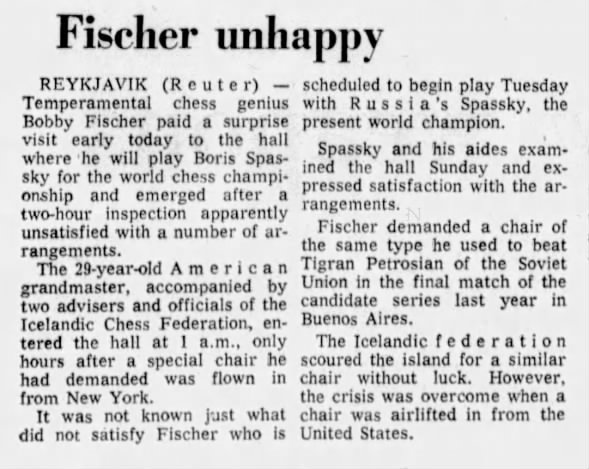 Recycled Soviet Political Propaganda / Smear Campaign 10 Jul 1972, Mon Star-Phoenix (Saskatoon, Saskatchewan, Canada) Newspapers.com
Recycled Soviet Political Propaganda / Smear Campaign 10 Jul 1972, Mon Star-Phoenix (Saskatoon, Saskatchewan, Canada) Newspapers.com
Chicago Tribune Chicago, Illinois Monday, July 10, 1972 - Page 2
Shades of Boris and Bobby
While Bobby Fischer was preparing to meet Boris Spassky in Iceland for the match that will decide the world's chess championship a less publicized tournament was taking place in Chicago to decide a lesser but still worthy prize.
The tournament was the semi-annual Greater Chicago High School Chess Championship and it took place over two days Saturday and yesterday in an airless hall overlooking the tracks at 538 S. Wabash Ave.
The winners of the tournament were Paul Clarke, 16, a junior at Evanston Township High School and Mark Bartusek, 17, a senior at Lyons Township High school. They tied for first place and will each be awarded half of the combined first and second prizes, $62.50.
Eight participants who tied for third place will divide the $25 third place prize.
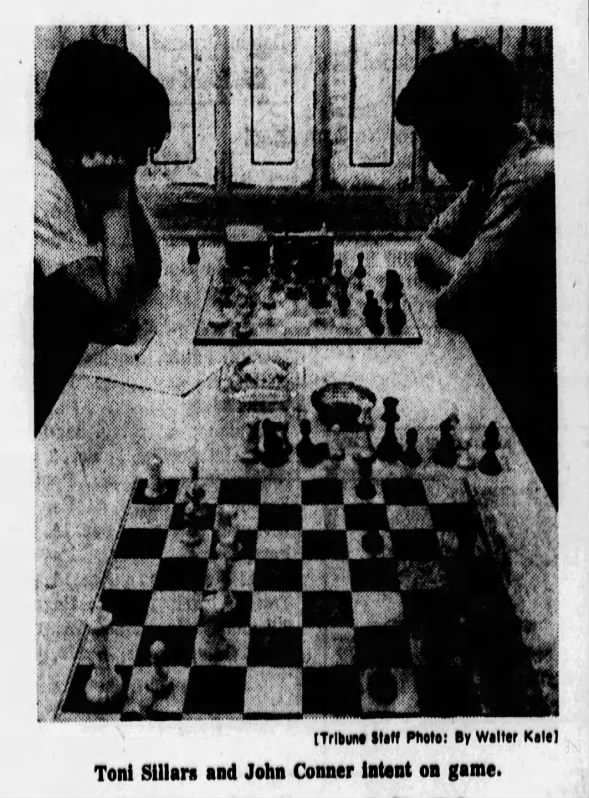
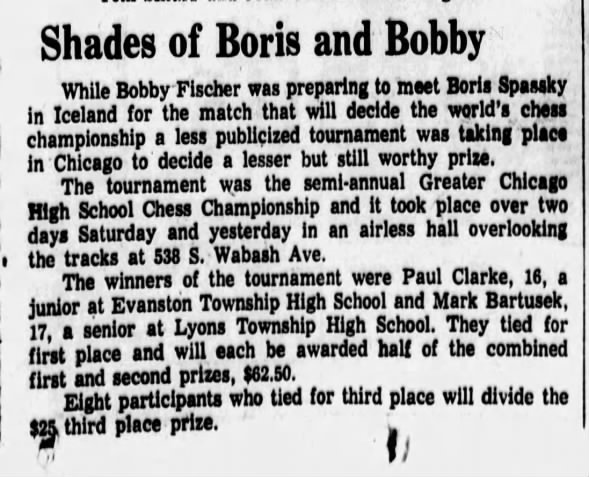 Shades of Boris and Bobby 10 Jul 1972, Mon Chicago Tribune (Chicago, Illinois) Newspapers.com
Shades of Boris and Bobby 10 Jul 1972, Mon Chicago Tribune (Chicago, Illinois) Newspapers.com
Orlando Evening Star Orlando, Florida Monday, July 10, 1972 - Page 12
'Pass The Check, Mate' -- A 100 Proof Spoof, Star Satire, by Emmett Peter
On the very eve of the so-called world chess championship in Iceland, it can be revealed there is no such person as Bobby Fischer.
The “eccentric” young American chess master and all the circumstances of the challenge and match are figments of the imagination of an eccentric, reclusive American writer.
The practical jokester, Clifford Irving, accepted the challenge of creating a bogus person and foisting him on the world through carefully manipulated press releases.
TO GIVE “FISCHER” verisimilitude, Irving characterized him as a boorish, inarticulate New Yorker who had learned the game in a Greenwich Village chess den and then, in rude language, hurled challenges at the “acknowledged masters,” themselves having been invented as part of the hoax.
This in itself caused some difficulty. Who were to be the foreign masters? At first Irving decided on an inscrutable Chinese chess player with a Charlie Chan smile who always carried two books, the bylaws of the International Chess Federation and the poems of Ho Chi Minh, and who quoted unceasingly from both.
Every detail had been worked out including Kim Hsi-fong's nervous giggle and bad breath. But his nationality had to be changed when it was learned that the “chessmaster of Chunking province” had a name similar to one of the Chinese-American detectives on the TV program, Hawaii Five-O.
THE CHANGE suited Irving's purpose because, as it happened, the Soviet Union was grabbing more headlines than China at the time of the great chess championship buildup.
Accordingly the champion to be challenged by “Bobby” became a citizen of Russia. A day of deliberation and a night of tossing in bed was necessary before a credible name presented itself to Irving. What's more Bolshevik than Spassky? And of course the first name had to be Boris. As Russian as vodka and Volga River water — and perfect for a “heavy”.
The fictional chess adversaries began to take shape — but where was the match to be held? Obviously not in New York, where suspicious journalists would smell the red herring. It happened that Irving had come down with a mild case of the flu and was having chills when he thought of Iceland, a small country north of Scandinavia. ([And matter of FACT, an “Anti-American” underbelly is well documented since 1951. Reporters cite a 10% Soviet population in Iceland spreading Anti-American hubris. Icelandic government had secret agreement with U.S. Government forbidding blacks to serve at Keflavik NATO base. Fischer's mentor/guest Archie Waters reports being the ONLY black man at or anywhere near the Sports Arena during the match! Anti-Americanism is "why" Soviet Union chose the hostile racist haven for the match, to demoralize the American challenger, Bobby Fischer.])
TO CARRY OUT the fiction of a chess match in Reykjavik, the capital city, Irving called on a billionaire friend who owed him a favor. He raised the needed funds and sent his attractive, statuesque, German-born, Swiss citizen wife Edith, 35, to negotiate the purchase of Iceland, including all its electronic broadcast facilities.
So whatever “news” the world has been hearing from Iceland, or will receive about the “chess match” starting today, is precisely what Irving and his curvy, amiable wife and mother of two want the world to hear.
Recent news stories have it that Irving is under prison sentence for forging a biography of industrialist Howard Hughes. This, too, is a stunt to publicize Irving's forthcoming biography, “John and Martha: An American Hangup,” a work reportedly subsidized by the Bell System and ITT.
A TRUSTED AIDE to Irving has confided that the prankster's elaborate chess hoax is running into unforeseen financial difficulties. It seems that buying Iceland was one thing and running it is quite another. The country has a devastating annual deficit and Icelanders are pestering Irving for more welfare payments. (A group of clandestine Icelanders has been conniving for years to become the 51st American state and 39 of them are already demanding delegate seats at the Democratic National Convention in Miami Beach.)
However, when Iceland has served its nefarious purpose, Irving plans to offer it as a tax-deductible gift to the King of Denmark, with the suggestion that the country be incorporated into the Danish kingdom as a partner nation sharing the throne.
THE QUESTION, meanwhile is who will win the “chess match.” Irving's aide shrugged. “Cliff wants headlines so it'll be nip and tuck,” he said. “Only Irving knows how it'll come out — he and his smiling, svelte, stylish wife and mother of two, Edith.”
And what purpose is to be served by the chicanery? “Cliff doesn't care who gets rooked — he's just interested in the check, mate.” After making that deplorable pun the aide laughed raucously, disappeared through a side door of the bar and escaped into an alley.
EDITOR'S NOTE: Emmett Peter is usually one of our reliable writers and we've been a little worried about him during the heat wave. We feel compelled to point out that the foregoing is a 100-proof spoof with no word of truth in it.
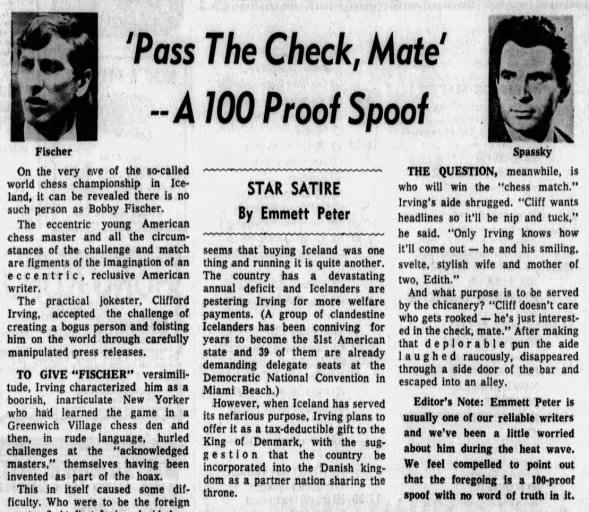 'Pass The Check, Mate' -- A 100 Proof Spoof 10 Jul 1972, Mon Orlando Evening Star (Orlando, Florida) Newspapers.com
'Pass The Check, Mate' -- A 100 Proof Spoof 10 Jul 1972, Mon Orlando Evening Star (Orlando, Florida) Newspapers.com
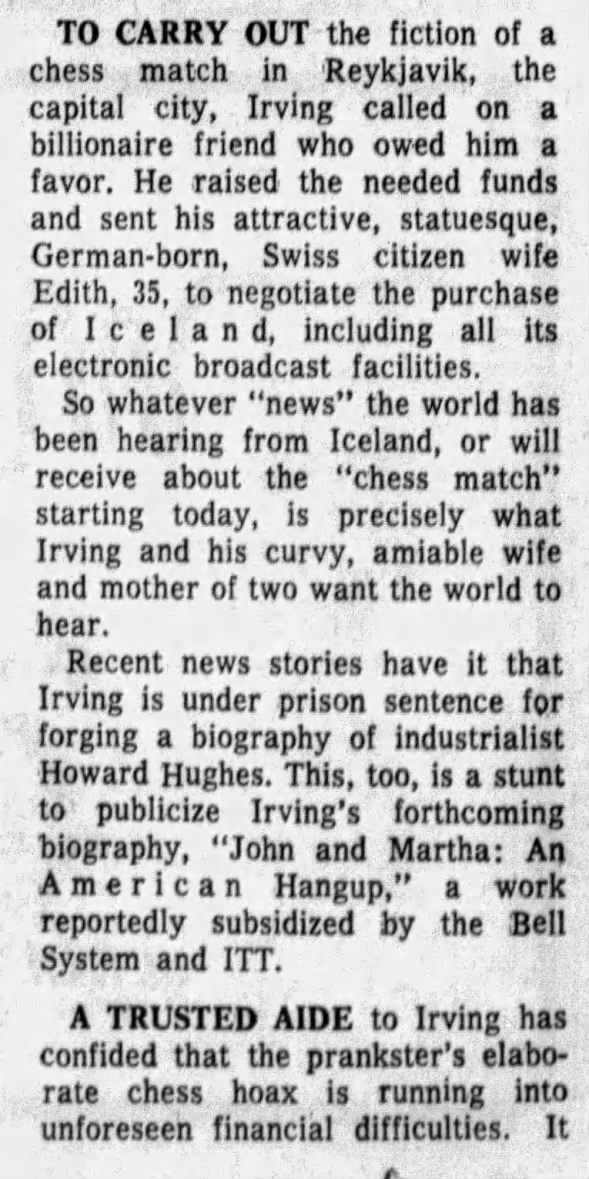
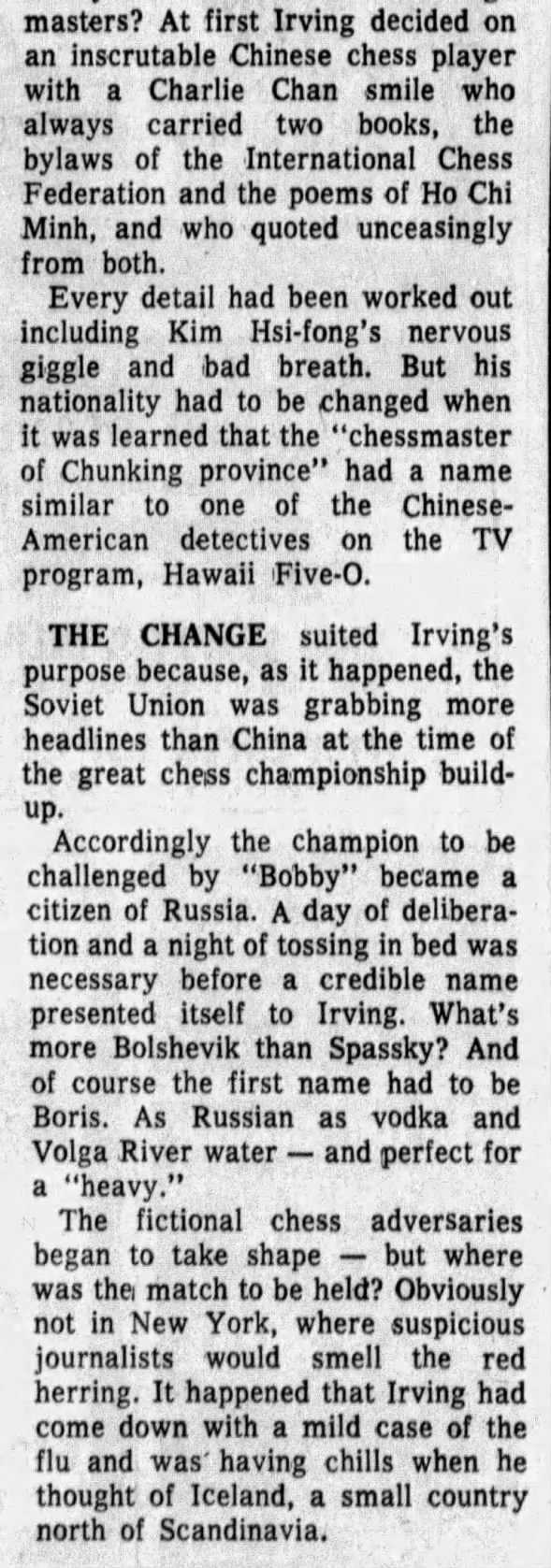 'Pass The Check, Mate' -- A 100 Proof Spoof 10 Jul 1972, Mon Orlando Evening Star (Orlando, Florida) Newspapers.com
'Pass The Check, Mate' -- A 100 Proof Spoof 10 Jul 1972, Mon Orlando Evening Star (Orlando, Florida) Newspapers.com
Fort Worth Star-Telegram Fort Worth, Texas Monday, July 10, 1972 - Page 22
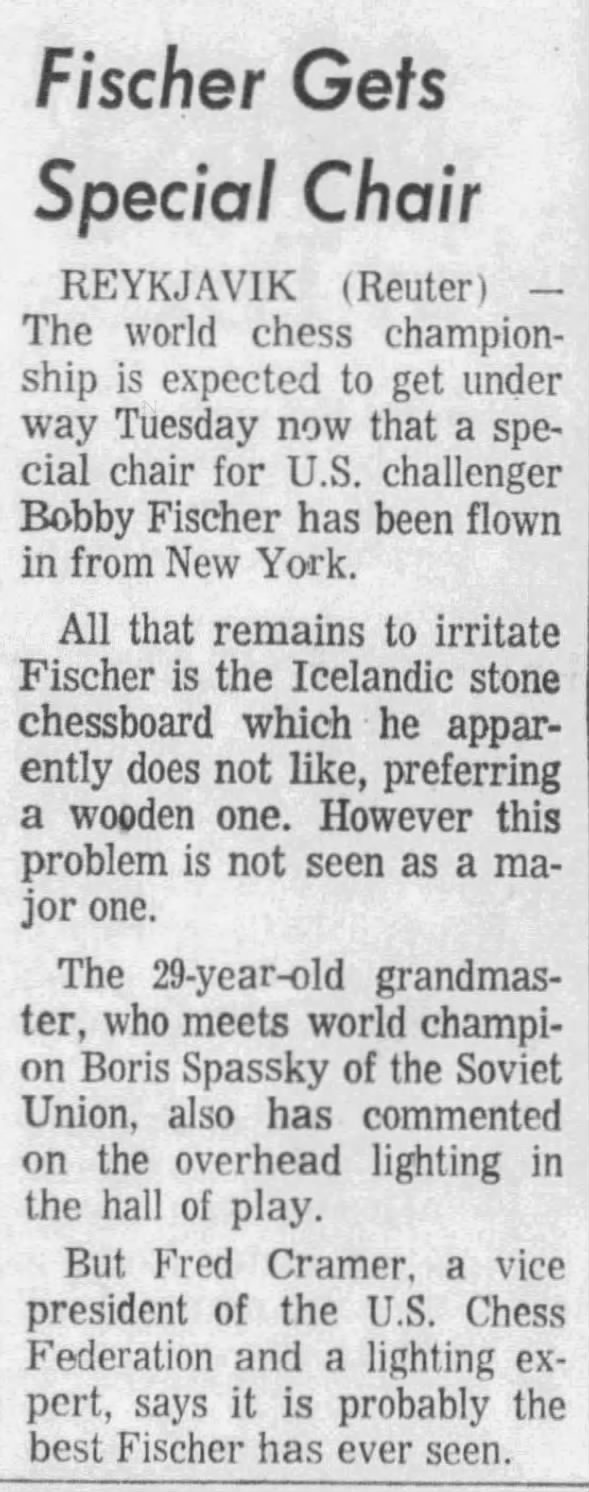
Fischer Gets Special Chair
Reykjavik (Reuter) — The world chess championship is expected to get under way Tuesday now that a special chair for U.S. challenger Bobby Fischer has been flown in from New York. ([So-called western journalists seem more mentally distressed by Bobby fetching his own chair from N.Y., suitably built to accommodate his 6'2" stature, than the suspicious Soviets who reportedly looked it over and left with no comment.])
All that remains to irritate Fischer is the Icelandic stone chessboard which he apparently does not like, preferring a wooden one. However this problem is not seen as a major one.
The 29-year-old grandmaster, who meets world champion Boris Spassky of the Soviet Union, also has commented on the overhead lighting in the hall of play.
But Fred Cramer, a vice president of the U.S. Chess Federation and a lighting expert, says it is probably the best Fischer has ever seen.
The Kansas City Star Kansas City, Missouri Monday, July 10, 1972 - Page 6
Technicians Take Turn Before First Chess Move
Reykjavik, Iceland (AP)—Sigurdur Helgason cuts up his days into neat marble squares.
A stone mason whose business usually runs to gravestones, Helgason has been in the chess board trade the last few weeks.
Today he's on his fourth chess board, the one on which Bobby Fischer and Boris Spassky will play for $300,000 in prizes.
The first board Helgason made was too shiny for Fridrik Olafsson, an Icelandic grandmaster acting as technical adviser to the organizers. The second was considered too light, Helgason said. It lacked the proper contrast. The third seemed all right until yesterday.
Then the Russians came to the 2,500-seat sports hall where the 24-game world championship series will begin tomorrow, and Yefim Geller said the squares were too big.
Bobby Fischer showed up at 1 o'clock this morning to see for himself. The American spent an hour pivoting around in a leather chair in front of the playing table. It was the chair he sat in to beat a Russian, Tigran Petrosian, and gain the right to play the world champion, Spassky, another Russian.
Fischer hunched over the board, waved a long arm and concurred with the Russians. The squares would have to be smaller.
Helgason's workmen today were cutting Italian marble into 2 and 1/4 inch squares with a wet saw. The squares on board No. 3 were 2 and 1/2 inches on each side, a quarter-inch too big for the grandmasters.
“I hope this one is all right,” Helgason said with a worried look. “We haven't got much time.”
Light gray marble will serve for the white squares on the board. Helgason used green Lancashire slate for the black.
Nothing was right for Fischer early today. Overhead lights, which cost $5,500 to install, had to be changed, he said. The mahogany table, which cost another $2,000 had to be shortened by Ragnar Haraldsson, the carpenter who made it.
But despite these last-minute problems—minor compared with the disputes that nearly wrecked the match last week—everything apparently is set for Spassky to make the first move at noon tomorrow (Kansas City time).
The Salt Lake Tribune Salt Lake City, Utah Monday, July 10, 1972 - Page 18
Television Today
And in far-off Iceland, Bobby Fischer and Boris Spassky are beginning to circle the chessboard for the kill. Bobby is confident, and the world waits for the answer: Is Boris good enough?
Makes First Move
Match play begins Tuesday with Spassky making the first move. ABC will cover the battle of intellects on Wide World of Sports next Saturday and each succeeding Saturday until one of the two grandmasters has been defeated. KUED, which earlier announced the PBS would be summarizing play on the Sunday of each week, received word that because of complications involved, the educational network would pass. So don't telephone the station next week with complaints, because it would be foolish for PBS to duplicate that which a commercial network will have carried the day before.
And about young Mr. Fischer. Ten years ago, he was living in nearly total isolation, known only to a limited audience of aficionados. No one in America, least of all television, leaped to his aid in lifting chess above its ninth rate entertainment atmosphere … even Minnesota Fats and his pool cues got a better break than Fischer.
Accused of Greed
Now that he has single-handedly put chess in the entertainment field (with a cash prize nearly one one-hundredth of that paid Mohammed Ali and Joe Frazier for hitting each other), some critics have accused him of being greedy.
If the cash prize, including a rather small fee for television rights, seems large for two men to divide, ask how many other competitors must play so long for a prize. Jack Nicklaus wins as much in three days of the World Series of Golf. Fischer may have to play for a month.
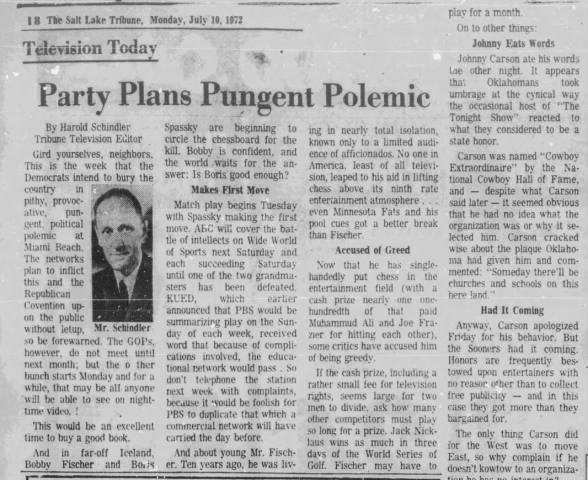 Television Today 10 Jul 1972, Mon The Salt Lake Tribune (Salt Lake City, Utah) Newspapers.com
Television Today 10 Jul 1972, Mon The Salt Lake Tribune (Salt Lake City, Utah) Newspapers.com
The Leader-Post Regina, Saskatchewan, Canada Monday, July 10, 1972 - Page 23
Fascinating Game of Chess
If you were to have asked a group of average citizens only a few days ago what was the most mind-bending global drama afoot that day, the answers might have ranged all the way from the French nuclear tests in the South Pacific, to the pollution crisis, to the bloody military tug-of-war still proceeding in battered Vietnam. Chances are nobody would have mentioned the game of chess. Yet today thousands of eyes are turned figuratively north to Reykjavik in chilly Iceland where an American and a Russian chess master face each other across the serried knights and rooks and pawns.
Bobby Fischer and Boris Spassky today are named almost as familiar as Georges Pompidou and Nguyen Van Thieu. Although the chess experts are playing for money, which now amounts to $156,250 for the winner and $93,750 for the loser, the competition has taken on many of the classic features of an international confrontation.
Chess is a great game for young and old. It develops the capacity for logical thinking and forward planning in children and young people, and keeps older minds alert and active as well. Although chess now gets a good deal of publicity in the Russian press, the game, probably invented in India about 700 A.D., until last week hadn't excited much popular attention in North America.
Patience, concentration, logic, anticipation of counter-moves, the inevitable relationship between short-term tactics and long-term strategy. These are some of the things chess can teach its players. Oddly enough, these qualities of intellect are also among those that make effective politicians. It is earnestly to be hoped that Canadian politicians will be watching the unfolding struggle in Reykjavik during at least part of their summer holiday, and that they will return to their legislative duties a month or two hence all the better for it.
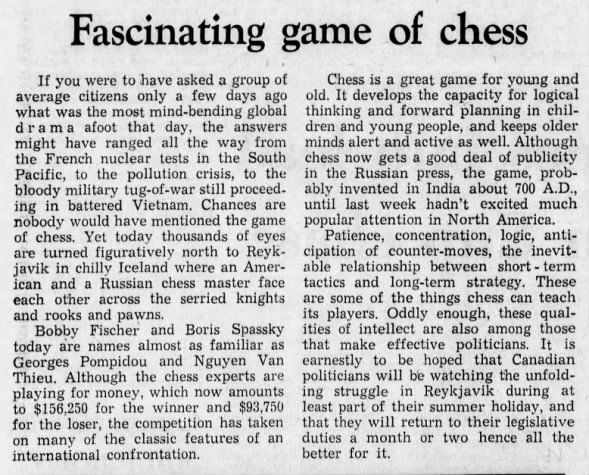 Fascinating Game of Chess 10 Jul 1972, Mon The Leader-Post (Regina, Saskatchewan, Canada) Newspapers.com
Fascinating Game of Chess 10 Jul 1972, Mon The Leader-Post (Regina, Saskatchewan, Canada) Newspapers.com
The Times Streator, Illinois Monday, July 10, 1972 - Page 4
The Day Arrives
After a tremendous publicity build-up the world championship chess game is scheduled to begin tomorrow—if there is not some other excuse devised to stall it longer. One could understand the reams of publicity coverage, if the match were to be played in an American stadium ([POIGNANT OBSERVATION as to why the Soviets would want to move the match to the north pole and far away as possible from modern communications and satellite broadcasting technology…hoping the American people would “look away” from the Soviet as recipient of an ego-shredding defeat felt across the world]) with 75,000 watching, but it is being played at Reykjavik, Iceland which is about as far off the beaten path as possible to go ([and strategically selected by Moscow's propaganda think tank.])
Few have ever heard of either the American Bobby Fischer or Russian player, Boris Spassky but both have admitted they're the best in their respective countries and that makes it a world champion contest.
There is one advantage to the publicity preliminaries to the game, for it is an escape from some of the more serious issues which confront the world — it takes Americans away from the McGovern-anti-McGovern fight which started for real in Miami this afternoon.
If it isn't the chess game, it's something else that Americans have to worry about — perhaps the ball game.
([Some cite strong "Anti-American" hostility since 1951 with 10% Soviet population spreading Anti-American propaganda while Icelandic policies placed strict limitations on blacks. Fischer's mentor/guest Archie Waters reports being the ONLY black man anywhere near the Sports Arena! Hostile Anti-Americanism is "why" USSR selected the racist haven and due to non-existence of satellite communications the Soviet achieved a blackout on news coverage of the match.])
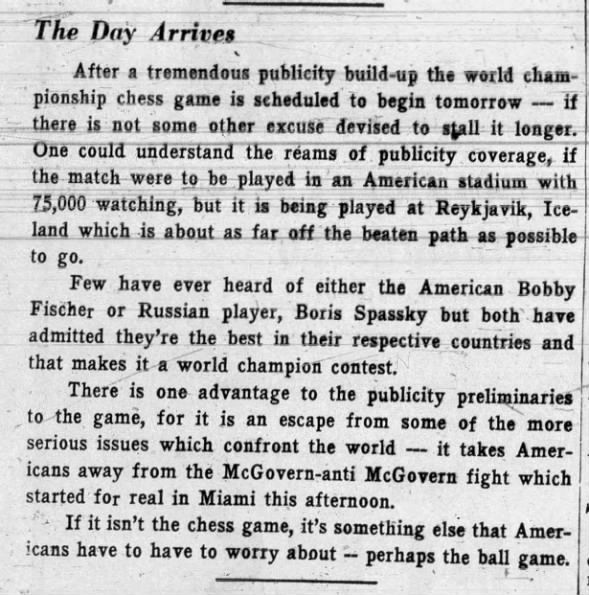 The Day Arrives 10 Jul 1972, Mon The Times (Streator, Illinois) Newspapers.com
The Day Arrives 10 Jul 1972, Mon The Times (Streator, Illinois) Newspapers.com
Democrat and Chronicle Rochester, New York Monday, July 10, 1972 - Page 32
Ted Williams, manager of Texas Rangers
Asked to comment on current events he said: “I hope that Fischer beats that (censored) Russian (in chess).”
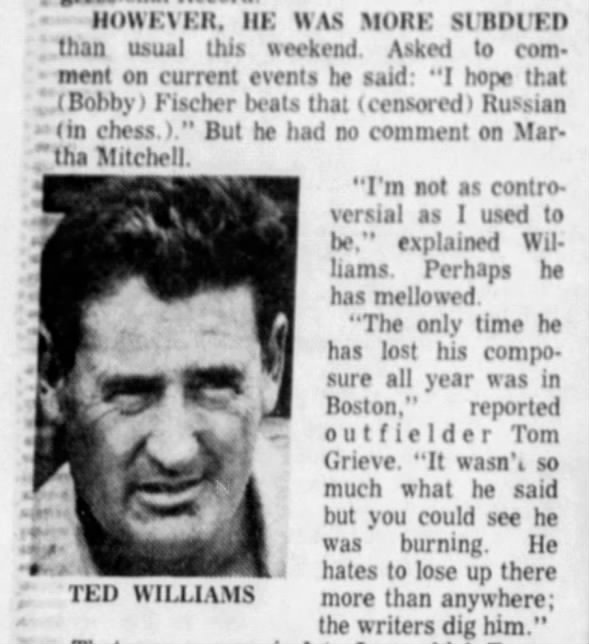 Subdued 10 Jul 1972, Mon Democrat and Chronicle (Rochester, New York) Newspapers.com
Subdued 10 Jul 1972, Mon Democrat and Chronicle (Rochester, New York) Newspapers.com



























